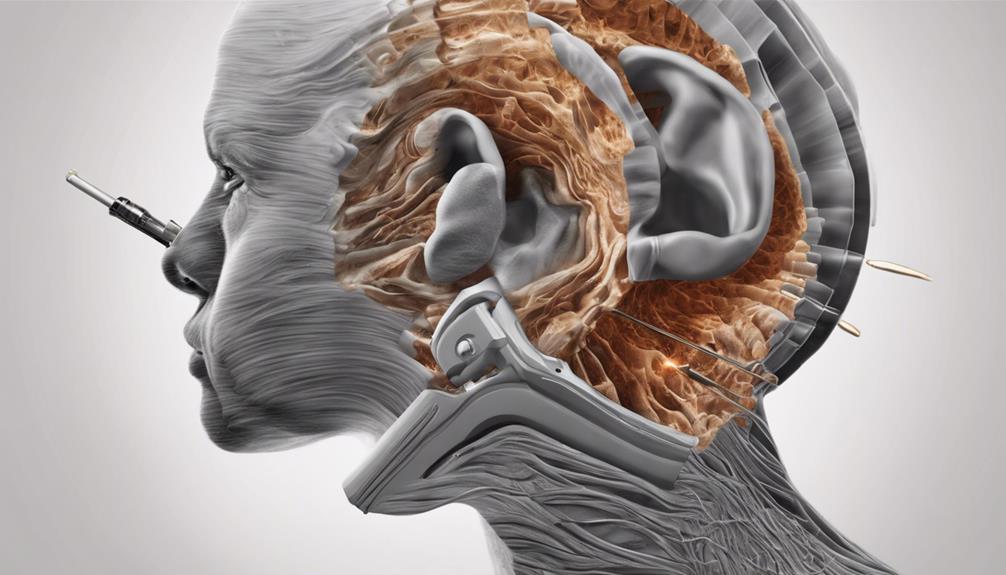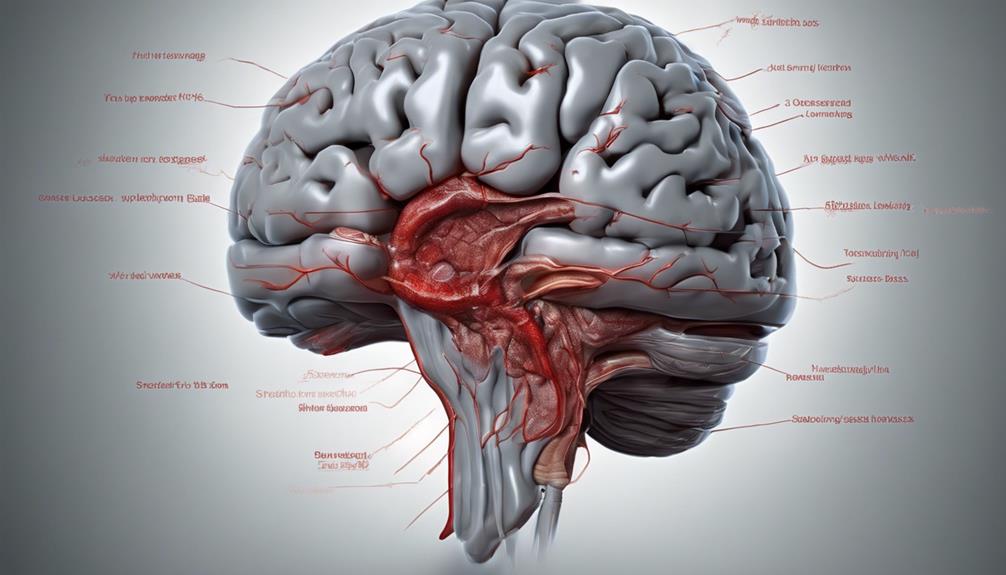In our research on illegal drugs causing hearing impairment, the harmful impact these substances have on auditory acuity is evident. The concerning outcomes of using cocaine compared to the hidden harm caused by methamphetamine underscore the significant connection between drug abuse and the decline in hearing wellness.
As we uncover the detrimental consequences of heroin, LSD, and ecstasy on hearing health, a startling revelation awaits regarding the dangers lurking in these illicit substances. Stay tuned to learn more about these alarming connections and the pressing need for awareness in mitigating drug-induced hearing loss.
Key Takeaways
- Cocaine and opioids like heroin can lead to sudden sensorineural hearing loss.
- Methamphetamine abuse can result in irreversible sensorineural hearing damage.
- Heroin abuse, especially in combination with cocaine, can cause bilateral hearing loss.
- Chronic LSD and ecstasy use can result in persistent auditory disturbances and potential hearing loss.
Cocaine and Hearing Loss
Cocaine abuse can precipitate sudden bilateral sensorineural hearing loss, particularly when combined with opioids like heroin in a practice known as speedballing. The vasoconstrictive properties of cocaine, coupled with its local anesthetic effects, can lead to cerebral vasospasm and affect neuronal sodium channels. These effects have the potential to disrupt cochlear blood flow and the central nervous system's processing of auditory signals.
Additionally, opioids, when abused, may also play a role in deafness through various mechanisms that interact with cocaine-induced auditory damage. The intricate interplay between these substances highlights the complexity of drug-induced hearing loss and the challenges in pinpointing specific causal pathways. While cases of hearing loss linked to cocaine or heroin use have been reported individually, instances of combined hearing impairment from speedballing remain relatively uncommon, necessitating further research to elucidate the underlying mechanisms.
Early identification of drug-induced hearing loss, particularly associated with cocaine and opioids, is essential for prompt intervention to mitigate the risk of permanent damage.
Methamphetamine and Auditory Damage

Methamphetamine abuse poses a significant risk of causing auditory damage, including sensorineural hearing loss and tinnitus, due to its vasoconstrictive properties impacting blood flow to the inner ear. Chronic use of methamphetamine can lead to damage to the auditory nerve and cochlea, potentially resulting in irreversible hearing loss. This type of substance abuse may exacerbate hearing issues over time, making it crucial for individuals to be aware of the permanent hearing damage that can occur and to seek help for addiction and related health concerns.
—
| Methamphetamine Auditory Damage | Effects |
|---|---|
| Sensorineural Hearing Loss | Damage to inner ear |
| Tinnitus | Ringing in the ears |
| Auditory Nerve Damage | Impaired nerve function |
| Cochlear Damage | Structural harm |
| Irreversible Hearing Loss | Permanent impairment |
—
Heroin and Its Impact on Hearing
The impact of heroin on hearing is characterized by the potential occurrence of sudden bilateral sensorineural hearing loss. Heroin abuse, especially when combined with cocaine in a practice known as speedballing, can exacerbate auditory disorders due to the vasoconstrictor and local anesthetic effects of cocaine, impacting neuronal sodium channels crucial for auditory function.
In cases of opioid overdose, individuals may exhibit symptoms like pinpoint pupils and unconsciousness, signaling a medical emergency requiring immediate intervention. Recovery from drug-induced hearing loss associated with heroin abuse may involve treatments such as betamethasone and prednisone, which aim to reduce inflammation and restore auditory function.
Understanding the mechanisms through which heroin and its interactions with substances like cocaine can lead to sensorineural hearing loss is critical in addressing the auditory consequences of substance abuse and providing appropriate interventions for individuals experiencing these issues.
LSD and Hearing Impairment

Exploring the effects of LSD on auditory function reveals a significant link between chronic LSD use and persistent auditory disturbances, ranging from mild perceptual changes to severe disruptions in auditory processing. When considering the impact of LSD consumption on hearing, several key points emerge:
- Auditory Hallucinations: Individuals under the influence of LSD may experience vivid auditory hallucinations, perceiving sounds that aren't actually present in their environment.
- Distortions in Perception: LSD can lead to distortions in auditory perception, causing individuals to hear sounds differently or inaccurately.
- Dosage and Chronic Use: Research indicates that the severity and persistence of auditory disturbances from LSD are influenced by factors such as dosage and the frequency of use. Higher doses and chronic consumption may elevate the risk of experiencing lasting auditory alterations.
Understanding the potential consequences of LSD on auditory function underscores the importance of informed decision-making regarding drug use to safeguard against long-term hearing impairments.
Ecstasy and Hearing Loss
Chronic use of ecstasy, also known as MDMA, poses a risk of causing temporary or permanent hearing loss due to its damaging effects on the inner ear's hair cells. Research indicates that ecstasy can harm these delicate cells, leading to hearing complications such as tinnitus, challenges in understanding conversations, and heightened sensitivity to loud sounds.
The extent of hearing loss from ecstasy can be influenced by factors like the frequency of drug use and the dosage consumed. Individuals who engage in regular ecstasy use may face a higher likelihood of experiencing detrimental effects on their hearing.
It's crucial to acknowledge that protecting one's ears from excessive noise exposure and refraining from using ecstasy are essential measures in preventing drug-induced hearing damage. Understanding the potential risks associated with ecstasy and taking proactive steps to safeguard one's hearing health can play a significant role in mitigating the adverse consequences of drug-related hearing loss.
Frequently Asked Questions
What Illegal Drug Causes Hearing Loss?
We know that illegal drugs like cocaine and opioids, such as heroin, are linked to auditory disorders like sensorineural hearing loss. Speedballing, a dangerous practice of combining these substances, can lead to sudden bilateral sensorineural hearing loss.
Cocaine acts as a vasoconstrictor and local anesthetic, impacting auditory physiology. Opioid abuse may also contribute to hearing loss through various proposed mechanisms. Further research is needed to fully understand the effects of these drugs on audiological physiology.
Which of the Following Drugs Can Cause Hearing Loss?
We've delved into the intricate world of drug-induced hearing issues. Among the substances known to cause auditory disorders are cocaine and opioids, specifically heroin.
Interestingly, the dangerous combination of cocaine and heroin, termed speedballing, has been associated with sudden bilateral sensorineural hearing loss.
As physicians, it's crucial for us to acknowledge drug-induced hearing loss as a possible complication in patients with recreational drug habits.
What Are the Four Ototoxicity Drugs?
The four main ototoxic drugs are aminoglycosides like gentamicin, neomycin, streptomycin, and tobramycin. These antibiotics can cause irreversible hearing loss and balance issues by damaging the inner ear's hair cells and auditory nerve function.
It's crucial to monitor for signs of hearing loss to prevent permanent damage when using aminoglycosides. Healthcare providers should discuss the potential risks and benefits with individuals taking these drugs.
What Are Five Common Medications That Are Potentially Ototoxic and May Cause Hearing Loss?
When it comes to medications that may cause hearing loss, it's crucial to pay attention to potential risks. Aminoglycoside antibiotics, chemotherapy drugs, loop diuretics, NSAIDs, and certain antimalarial drugs can all have ototoxic effects.
Understanding these risks can help us make informed decisions about our health.
Conclusion
In conclusion, the correlation between illegal drugs and hearing loss is a critical concern. The auditory damage caused by substances like cocaine, methamphetamine, heroin, LSD, and ecstasy is well-documented.
Understanding the mechanisms behind drug-induced hearing impairment is essential for prevention and intervention.
Let's strive to spread awareness about the dangers of these substances and work towards protecting our precious auditory system from harm.










